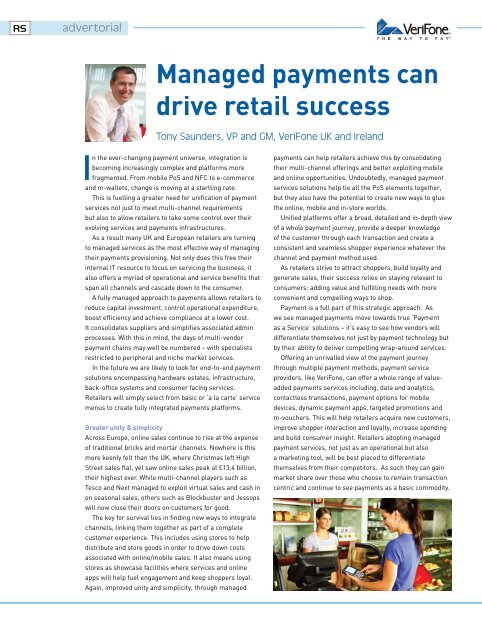You also want an ePaper? Increase the reach of your titles
YUMPU automatically turns print PDFs into web optimized ePapers that Google loves.
RS advertorial<br />
Managed payments can<br />
drive retail success<br />
Tony Saunders, VP and GM, VeriFone UK and Ireland<br />
In the ever-changing payment universe, integration is<br />
becoming increasingly complex and platforms more<br />
fragmented. From mobile PoS and NFC to e-commerce<br />
and m-wallets, change is moving at a startling rate.<br />
This is fuelling a greater need for unification of payment<br />
services not just to meet multi-channel requirements<br />
but also to allow retailers to take some control over their<br />
evolving services and payments infrastructures.<br />
As a result many UK and European retailers are turning<br />
to managed services as the most effective way of managing<br />
their payments provisioning. Not only does this free their<br />
internal IT resource to focus on servicing the business, it<br />
also offers a myriad of operational and service benefits that<br />
span all channels and cascade down to the consumer.<br />
A fully managed approach to payments allows retailers to<br />
reduce capital investment, control operational expenditure,<br />
boost efficiency and achieve compliance at a lower cost.<br />
It consolidates suppliers and simplifies associated admin<br />
processes. With this in mind, the days of multi-vendor<br />
payment chains may well be numbered – with specialists<br />
restricted to peripheral and niche market services.<br />
In the future we are likely to look for end-to-end payment<br />
solutions encompassing hardware estates, infrastructure,<br />
back-office systems and consumer facing services.<br />
Retailers will simply select from basic or ‘a la carte’ service<br />
menus to create fully integrated payments platforms.<br />
Greater unity & simplicity<br />
Across Europe, online sales continue to rise at the expense<br />
of traditional bricks and mortar channels. Nowhere is this<br />
more keenly felt than the UK, where Christmas left High<br />
Street sales flat, yet saw online sales peak at £13.4 billion,<br />
their highest ever. While multi-channel players such as<br />
Tesco and Next managed to exploit virtual sales and cash in<br />
on seasonal sales, others such as Blockbuster and Jessops<br />
will now close their doors on customers for good.<br />
The key for survival lies in finding new ways to integrate<br />
channels, linking them together as part of a complete<br />
customer experience. This includes using stores to help<br />
distribute and store goods in order to drive down costs<br />
associated with online/mobile sales. It also means using<br />
stores as showcase facilities where services and online<br />
apps will help fuel engagement and keep shoppers loyal.<br />
Again, improved unity and simplicity, through managed<br />
payments can help retailers achieve this by consolidating<br />
their multi-channel offerings and better exploiting mobile<br />
and online opportunities. Undoubtedly, managed payment<br />
services solutions help tie all the PoS elements together,<br />
but they also have the potential to create new ways to glue<br />
the online, mobile and in-store worlds.<br />
Unified platforms offer a broad, detailed and in-depth view<br />
of a whole payment journey, provide a deeper knowledge<br />
of the customer through each transaction and create a<br />
consistent and seamless shopper experience whatever the<br />
channel and payment method used.<br />
As retailers strive to attract shoppers, build loyalty and<br />
generate sales, their success relies on staying relevant to<br />
consumers: adding value and fulfilling needs with more<br />
convenient and compelling ways to shop.<br />
Payment is a full part of this strategic approach. As<br />
we see managed payments move towards true ‘Payment<br />
as a Service’ solutions – it’s easy to see how vendors will<br />
differentiate themselves not just by payment technology but<br />
by their ability to deliver compelling wrap-around services.<br />
Offering an unrivalled view of the payment journey<br />
through multiple payment methods, payment service<br />
providers, like VeriFone, can offer a whole range of valueadded<br />
payments services including, data and analytics,<br />
contactless transactions, payment options for mobile<br />
devices, dynamic payment apps, targeted promotions and<br />
m-vouchers. This will help retailers acquire new customers,<br />
improve shopper interaction and loyalty, increase spending<br />
and build consumer insight. Retailers adopting managed<br />
payment services, not just as an operational but also<br />
a marketing tool, will be best placed to differentiate<br />
themselves from their competitors. As such they can gain<br />
market share over those who choose to remain transaction<br />
centric and continue to see payments as a basic commodity.


